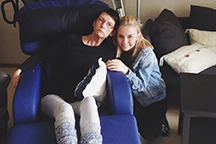Hope in the face of Huntington’s
February 15, 2016

Photo courtesy of Hannah Holvik
Junior Hannah Holvik visits her mother, Heidi Holvik, at a rehabilitation center in Drammen, Norway. Her mother has been fighting Huntington’s disease for nearly two decades.
It’s a mixed feeling, seeing a loved one after so long only to see the ceaseless pain behind their eyes. There’s a subtle ache after every hug, a strain in her voice after every word, and it takes a whole lot of courage to express her boundless love.
For junior Hannah Holvik, this unrelenting reality is all too familiar. Her mother, Heidi Holvik, was diagnosed with a degenerative illness called Huntington’s disease before she was born. Although the disease is uncommon, its long term effects match those of Alzheimer’s, Schizophrenia, and Parkinson’s. She now lives in Norway, where she was born, to receive proper care at a rehabilitation facility. Despite the heartache Huntington’s has caused Holvik, she has remained strong in honor of her mother’s endurance.
“I’m so happy to see my mom when I get to visit her in Norway and I know that it makes her happy to see me,” Holvik said. “But it’s also hard not to cry because seeing her in that state hurts my heart. The hardest part is knowing that she wants to say something, but she can’t. The only thing I can do is answer the questions that I know she’d be asking, like ‘How are you?’ and ‘What have you been up to?’. ”
People with Huntington’s disease often begin to show an onset of symptoms between the ages of 30 and 50. The hallmark symptom of Huntington’s is the uncontrolled movements, the first glimpse for Holvik to see how the disease was taking its toll on her mother.
“I noticed her symptoms when I was around five years old,” Holvik said. “I remember her not having good balance. She fell on her back once, and then she landed on a knee high table. That’s when I really started noticing how Huntington’s was affecting her.”
Over time, the disease slowly starts taking complete control over the person’s life. They become subject to a range of psychiatric disorders, and they lose their physical and cognitive aptness as well.
“Huntington’s starts off by affecting the person psychologically,” Holvik said. “They can be bipolar, and they can also be depressed and suicidal. Huntington’s can affect their physical abilities too. First, my mom was limping and slurring her words. Now, she really doesn’t have any control over her own body. She can say a few words, but it’s really hard for her. It differs from person to person, though. Some people can walk, and some people can’t.”
Eventually, loved ones may become unrecognizable faces. Further down in the deteriorative process, recalling stored information can become a huge difficulty for those with Huntington’s Disease.
“When you have Huntington’s, you eventually forget things from the past,” Holvik said. “I’m just scared that one day I’m going to visit her, and she won’t remember me.”
However, the risk of losing muscle coordination and the ability to clearly think is not the scariest part of Huntington’s to some people. The disease is also a genetic disorder, so the offspring of those with Huntington’s have a fifty percent risk of inheriting the neurodegenerative illness. This prospect used to torment Holvik, but she has learned that it is better to enjoy and cherish life as she knows it.
“I did go through years of depression, and I was so worried about my future,” Holvik said. “It was a hard time. But now I realize that if I help raise awareness, more people will donate for a cure. We’re only getting closer to finding that cure. Besides, it only affects me when I’m older, and I still have a lot of time to live my life. I might not even get it, so why waste my time worrying.”
According to Holvik, the most heartbreaking part of it all is the fact that her mom is a prisoner of her own body, unable to express herself without feeling tremendous amounts of pain.
“The hardest part is knowing that she wants to get up and hug me, but she can’t,” Holvik said. “She wants to be a normal mom, but she can’t. I know that it makes her sad, and it hurts to see her like that.”
There have been ups and downs, but ultimately, Holvik is proud of her mom for fighting Huntington’s disease for nearly two decades. It’s not an easy thing to do, but according to Holvik, it is possible to accomplish almost anything with a persevering spirit like her mom’s.
“Most people live 10 to 15 years with the disease, but my mom has been living with it for 17,” Holvik said. “I’m just proud of her. I’m proud that she tries to talk knowing that it’s nearly impossible for her to control herself, and I’m proud that she has stayed strong for me and my siblings. She is a hero and she deserves to know that. I can happily say that my mother has Huntington’s disease, because behind that, she is the strongest person.”
*If you would like to make a donation and support finding a cure for Huntington’s disease, you may do so at http://hdsa.org.
mariah • Mar 10, 2016 at 1:29 pm
this is amazing
Haannah Holvik • Feb 23, 2016 at 9:34 am
my heart thank u roba its beautiful
Emily B • Feb 17, 2016 at 11:11 pm
Roba, this is so good!! Proud of you :))